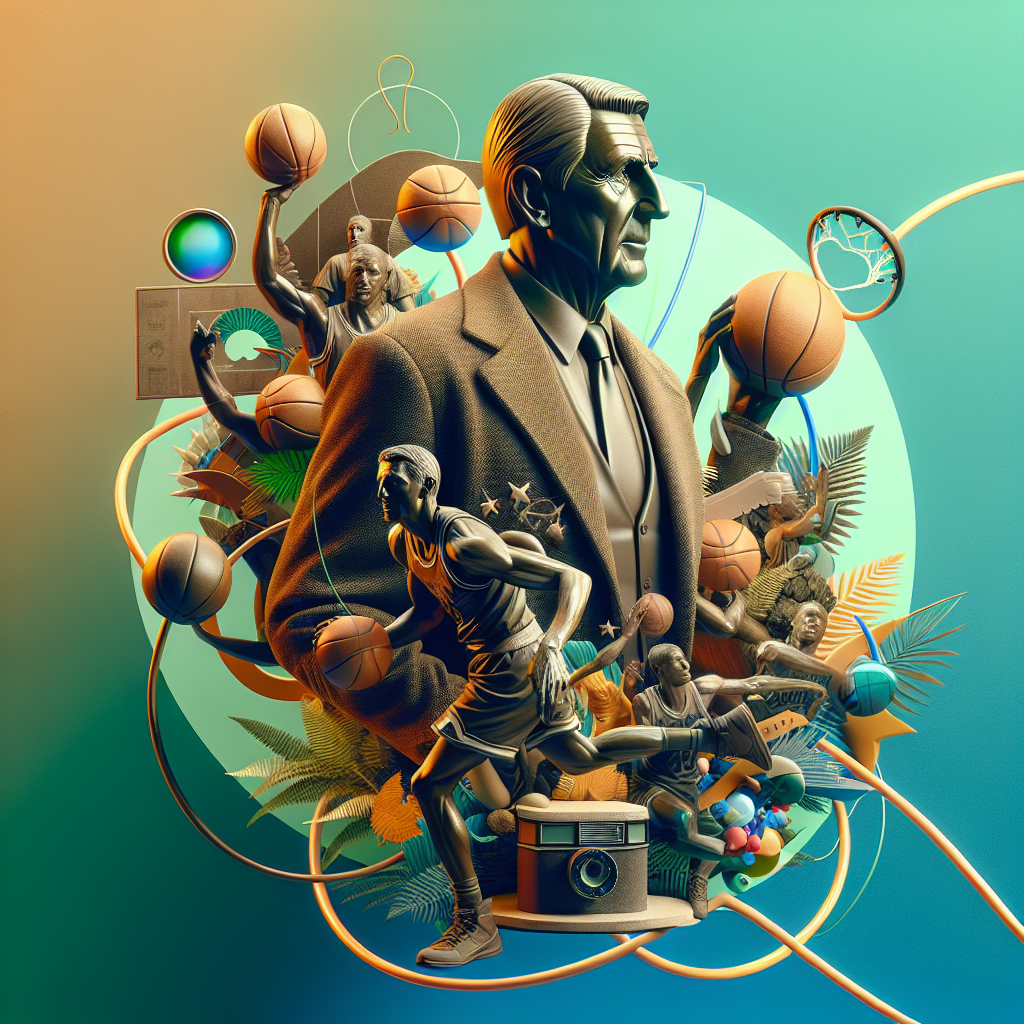Josh Powell’s insights on Lakers legacy, Phil Jackson’s strategies, and LeBron James statue

Josh Powell’s Insights On Lakers Legacy
Josh Powell, a former NBA player who had the privilege of donning the Los Angeles Lakers jersey, offers a unique perspective on the storied legacy of one of the most successful franchises in sports history. His insights delve into the intricate tapestry that has been woven by the Lakers over decades, highlighting the contributions of legendary figures, the strategic genius of Phil Jackson, and the potential future honor for LeBron James.
Powell’s tenure with the Lakers coincided with a period of remarkable success, including back-to-back championships in 2009 and 2010. Reflecting on this era, Powell emphasizes the importance of the Lakers’ culture, which is built on a foundation of excellence, resilience, and an unwavering commitment to winning. This culture, he notes, is not merely a product of the players on the court but also the result of a cohesive organizational philosophy that permeates every level of the franchise. From the front office to the coaching staff, and down to the players, there is a shared understanding that wearing the Lakers jersey comes with immense responsibility and expectations.
Transitioning to the strategic acumen of Phil Jackson, Powell provides an insider’s view of the coaching methods that propelled the Lakers to greatness. Jackson, renowned for his implementation of the Triangle Offense, brought a level of sophistication and discipline that was instrumental in the team’s success. Powell recounts how Jackson’s approach went beyond X’s and O’s; it was about fostering a sense of unity and purpose among the players. Jackson’s ability to manage egos, build trust, and create a harmonious environment was as crucial as his tactical expertise. Powell underscores that Jackson’s strategies were not just about winning games but about cultivating a championship mindset that could withstand the pressures of the NBA playoffs.
As the conversation shifts to contemporary times, Powell addresses the impact of LeBron James on the Lakers’ legacy. LeBron, who joined the Lakers in 2018, has already etched his name into the annals of the franchise with a championship in 2020. Powell acknowledges LeBron’s unparalleled talent and leadership, which have been pivotal in restoring the Lakers to their former glory. He suggests that LeBron’s contributions to the team and the city of Los Angeles are deserving of the highest honors, including the possibility of a statue outside the Staples Center. Such a tribute, Powell argues, would not only recognize LeBron’s achievements but also symbolize the continuation of the Lakers’ legacy of greatness.
In conclusion, Josh Powell’s insights offer a comprehensive understanding of what makes the Lakers a perennial powerhouse in the NBA. The legacy of the Lakers is a mosaic of individual brilliance, strategic innovation, and a collective commitment to excellence. Phil Jackson’s strategies and leadership have left an indelible mark on the franchise, while LeBron James continues to build on this rich history with his extraordinary contributions. As Powell reflects on his experiences and observations, it becomes clear that the Lakers’ legacy is not just about past triumphs but also about an enduring pursuit of greatness that inspires future generations.
Phil Jackson’s Strategies

Josh Powell, a former NBA player who had the privilege of playing under the legendary coach Phil Jackson, offers a unique perspective on the strategies that have cemented Jackson’s legacy in the annals of basketball history. Powell’s insights reveal the intricate layers of Jackson’s coaching philosophy, which not only brought success to the Los Angeles Lakers but also left an indelible mark on the sport itself.
One of the most notable aspects of Phil Jackson’s strategies is his implementation of the Triangle Offense. This offensive scheme, originally developed by Sam Barry and later refined by Jackson and his assistant coach Tex Winter, emphasizes spacing, ball movement, and player versatility. Powell recalls how Jackson’s meticulous attention to detail in teaching the Triangle Offense created a cohesive unit on the court. The system’s reliance on constant motion and quick decision-making required players to develop a deep understanding of each other’s tendencies, fostering a sense of unity and trust that was crucial to the Lakers’ success.
Moreover, Jackson’s approach to player management was another cornerstone of his coaching strategy. Powell highlights Jackson’s ability to manage egos and personalities, a skill that was particularly vital in a team filled with superstars like Kobe Bryant and Shaquille O’Neal. Jackson’s use of psychological tactics, often referred to as “Zen Master” techniques, helped players maintain focus and composure under pressure. His emphasis on mindfulness and mental preparation allowed the team to navigate the highs and lows of a grueling NBA season, ultimately leading to multiple championships.
Transitioning from Jackson’s strategies to the broader context of the Lakers’ legacy, Powell underscores the importance of leadership and adaptability. Jackson’s ability to evolve his coaching methods to suit the changing dynamics of the team was instrumental in sustaining the Lakers’ dominance. This adaptability is mirrored in the current era by LeBron James, whose leadership and versatility have been pivotal in the Lakers’ recent successes. Powell draws parallels between Jackson’s influence and LeBron’s impact, noting that both figures have contributed significantly to the Lakers’ storied history.
As the conversation shifts to the future, Powell contemplates the possibility of a LeBron James statue outside the Staples Center. He argues that such an honor would be a fitting tribute to LeBron’s contributions to the franchise. LeBron’s arrival in Los Angeles marked a new chapter for the Lakers, bringing renewed hope and championship aspirations. His ability to elevate the performance of his teammates, much like Jackson did as a coach, has been a key factor in the team’s resurgence. Powell believes that a statue would not only celebrate LeBron’s achievements but also serve as a symbol of the enduring legacy of excellence that defines the Lakers.
In conclusion, Josh Powell’s reflections on Phil Jackson’s strategies provide valuable insights into the elements that have shaped the Lakers’ legacy. From the implementation of the Triangle Offense to the management of player dynamics, Jackson’s influence is evident in the team’s sustained success. As the Lakers continue to build on this legacy, the contributions of current stars like LeBron James further underscore the importance of leadership and adaptability. A statue of LeBron would be a testament to his impact and a reminder of the enduring principles that have guided the Lakers to greatness.
LeBron James Statue
Josh Powell, a former NBA player who had the privilege of playing for the Los Angeles Lakers, has offered some compelling insights into the legacy of the Lakers, the strategic genius of Phil Jackson, and the potential for a LeBron James statue. Powell’s reflections provide a unique perspective, given his firsthand experience and understanding of the intricacies of professional basketball.
Powell begins by acknowledging the rich history and enduring legacy of the Lakers, a franchise that has been synonymous with success and excellence in the NBA. He emphasizes that the Lakers’ legacy is built on a foundation of legendary players, iconic moments, and a culture of winning that has been meticulously cultivated over decades. This legacy, according to Powell, is not just about the championships and accolades but also about the values and principles that the organization upholds. The Lakers have always been about more than just basketball; they represent a standard of excellence that transcends the sport.
Transitioning to Phil Jackson, Powell highlights the profound impact that the legendary coach had on the Lakers’ success during his tenure. Jackson, known for his Zen-like approach and the implementation of the Triangle Offense, brought a unique blend of strategic acumen and psychological insight to the team. Powell notes that Jackson’s strategies were not just about X’s and O’s but also about understanding the human element of the game. Jackson’s ability to manage egos, foster team cohesion, and maintain a calm demeanor under pressure were crucial factors in the Lakers’ championship runs. Powell’s admiration for Jackson is evident as he recounts how the coach’s philosophies and methods left an indelible mark on the players and the organization as a whole.
As the conversation shifts to LeBron James, Powell’s tone becomes one of reverence and respect. He acknowledges LeBron’s monumental contributions to the game of basketball and his significant impact on the Lakers since joining the team. Powell argues that LeBron’s influence extends beyond his on-court performance; he has become a leader and a role model, both within the Lakers organization and in the broader community. LeBron’s commitment to excellence, his work ethic, and his ability to elevate the play of those around him are qualities that Powell believes are deserving of the highest recognition.
In discussing the potential for a LeBron James statue, Powell is unequivocal in his support. He asserts that LeBron’s achievements with the Lakers, including leading the team to an NBA championship in 2020, have solidified his place in the pantheon of Lakers greats. Powell contends that a statue would not only honor LeBron’s contributions to the team but also serve as a symbol of his enduring legacy in the sport. Such a tribute would be a fitting acknowledgment of LeBron’s impact and a testament to his status as one of the greatest players in NBA history.
In conclusion, Josh Powell’s insights offer a nuanced and informed perspective on the Lakers’ legacy, Phil Jackson’s strategic brilliance, and the potential for a LeBron James statue. His reflections underscore the importance of recognizing and celebrating the contributions of those who have shaped the game of basketball and left an indelible mark on the sport. Through his thoughtful analysis, Powell provides a deeper understanding of what it means to be part of the Lakers’ storied history and the enduring legacy of excellence that defines the franchise.

